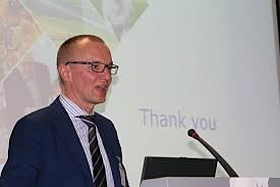EFSA’s director discusses on innovation and agriculture

Bernhard Url is the executive director at the European Food Safety Agency
(EFSA). He gave an interesting interview to EURACTIV.com on different topics
related with innovation and agriculture.
Speaking of farming practices and reducing the impact of pesticides
in the environment, EFSA’s director suggested different strategies: replace
higher risk pesticides with low-risk pesticides, but also a more targeted use
of pesticides based on an integrated pest management that effectively reduces
the use of chemicals. The latter would include means such as crop rotation, soil fertility or using cultivars that are resistant to
certain pests.
Mr. Url
calls for surveillance and monitoring services that monitor the growth
of pathogens, weather conditions and climate, the pressure of pests and then
advice the appropriate time to apply the pesticide. Mr. Url says the European
Court of auditors also calls for greater emphasis on this topic.
Genomic
crop-breeding techniques are also discussed in the
interview as EFSA is currently evaluating the suitability of their tools for
risk assessment of new techniques like genome editing, synthetic biology and
gene drive. EFSA’s director says innovation will be needed in the form of
technology, knowledge and data to assess the risks, maybe even the benefits of
these new technologies. Mr. Url points that “one of the main challenges of EFSA
is to keep up with industry, which innovates relentlessly”. EFSA needs to
develop the right methods to assess the innovation and support new legal
frameworks faster.
Regarding glyphosate
renewal process EFSA’s director says that “European Chemicals Agency (ECHA)
will determine whether glyphosate is carcinogenic or not, and on the basis of
that, EFSA will carry out the risk assessment, which looks at the risks on
human health, the environment and biodiversity when exposed to the active
substance”.
Finally,
EFSA calls for a distinction to be made between scientific and political
questions. Science can deliver an opinion on the use of herbicides based on
evidence, then there is a political opinion based on each other’s values.
EUXDAT addresses
the problems above mentioned contributing to the development of surveillance
and monitoring services providing an advanced e-Infrastructure for the
agricultural domain.
The full
interview was published on the 20 and 21 February and is available from:
